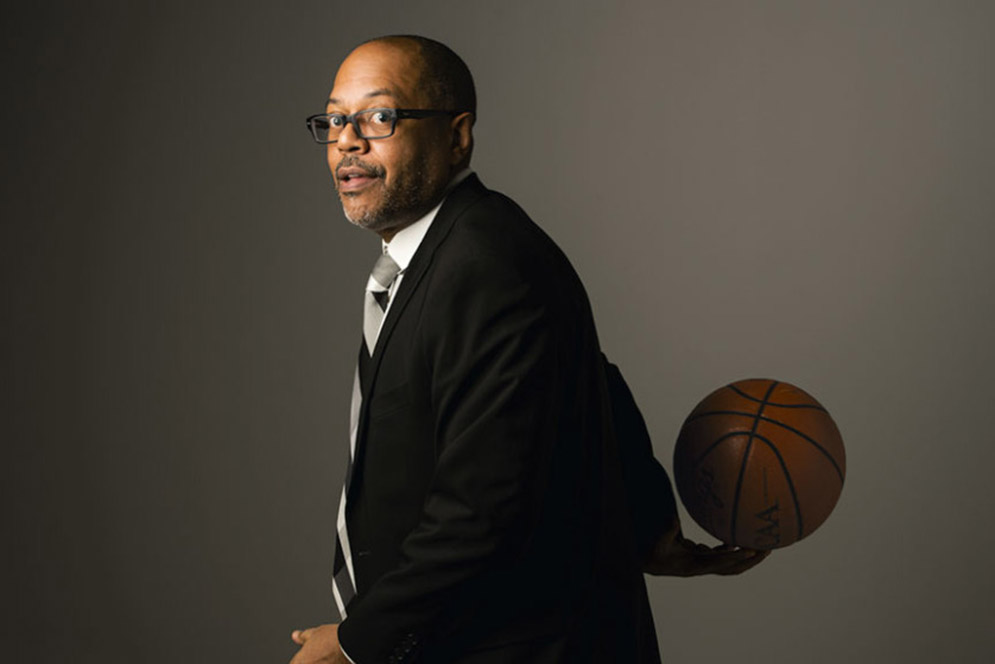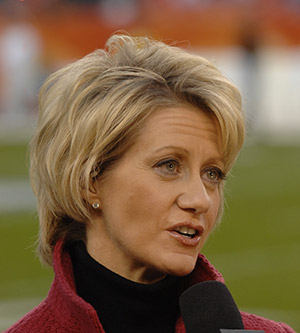Second BU Play It Forward Summit Tackles Race and Gender
Breakfast with Champions highlights Friday event

ESPN’s Kevin Merida (COM’79), a BU trustee, says athletes can help focus attention on issues that concern them. Photo courtesy of ESPN Images
It’s no surprise that racism and misogyny crop up in stadiums and ballparks as much as anywhere else in America today. “Sports are a microcosm of the rest of society,” says Kevin Merida (COM’79), ESPN senior vice president and editor in chief of The Undefeated sports blog. But now, says Merida, who is also a BU trustee, “athletes are speaking out on issues. They’re seeing the same kind of social issues everyone else is seeing and reacting to them. Because of the influence they have, a lot of their reactions get attention.”
Race and gender in sports are in focus for this Friday’s second annual Play It Forward sports communication summit, cosponsored by the College of Communication and BU Athletics, with additional support from WBUR, BU’s National Public Radio station, and the University’s Howard Thurman Center for Common Ground.
“One of the reasons we’re doing this conference is because in this day and age sports journalists need to be conversant with more than just the Xs and Os, what goes on out on the field, and who was drafted with the first pick,” says COM lecturer and summit host Andrea Kremer, chief correspondent for the NFL Network, correspondent for Real Sports with Bryant Gumbel on HBO, and cohost of We Need to Talk on the CBS Sports Network.
The event kicks off with a Breakfast with Champions, hosted by Kremer, examining Boston’s current run of sports success with Red Sox president Dave Dombrowski, New England Patriots safety and two-time Super Bowl champion Devin McCourty, 2008 World Champion Boston Celtics forward turned Celtics TV announcer Brian Scalabrine, and former Boston Bruins player and Bruins Foundation executive director Bob Sweeney.
Kremer will moderate the What’s Next in Sports: Gender Separate but Equal? panel with radio anchor and Sports Illustrated web columnist Julie DiCaro, WBUR/NPR sports and society reporter Shira Springer, swimmer and 12-time Olympic medalist Dara Torres, and writer and ESPN contributor Annie Apple, the mother of New York Giants cornerback Eli Apple.

There’s no shortage of material for conversation around gender and sports, including the pay-disparity battle fought recently by the US women’s hockey team, whose players won a large raise from governing body USA Hockey only after threatening to boycott the 2017 world championships. Attendees will also get a look at the problems women journalists face in a field that many men consider a male-only preserve.
“There’s always been a segment of the population that doesn’t want to hear women talk about sports,” Kremer says. “Because of the climate in the country right now, it’s probably heightened, but it’s always there.”
The session will include an excerpt from the 2016 More Than Mean video that focused on abusive, misogynist tweets sent to panelist DiCaro and ESPN’s Sarah Spain. The video underlines the way the anonymity of the internet emboldens some to say things they would never dare say in person, Kremer says. “It’s really powerful and really disturbing,” she says. “You’re seeing a man read a faceless tweet: ‘I hope you’re Bill Cosby’s next victim.’ And why? Because she’s a female sportscaster?”
Social media also works for the good, helping to make athletes’ opinions known. “Athletes have lots of followers, and they take to those platforms to communicate what they feel,” Merida says. “That’s a mechanism that didn’t exist in the days of Jim Brown, Kareem Abdul-Jabbar, and John Carlos and Tommie Smith, who were associated with activism in a different generation.” Carlos and Smith were 1968 Olympians.
Race, of course, is even more charged a subject than gender, as seen in issues like the racial disparities between players and management in the NBA and the NFL and the case of Colin Kaepernick, whose career appears threatened by his decision to kneel during the playing of the National Anthem at games to protest treatment of African Americans. Merida will moderate the What’s Next in Sports: Race Matters panel discussion with ESPN SportsCenter cohost Jemele Hill and Ezra Edelman, producer-director of the Oscar-winning best documentary OJ: Made in America, released on ESPN’s 30 for 30 series as well as theatrically.
McCourty is one of several Patriots, mainly African Americans, who will skip the upcoming visit to the White House by the Super Bowl champions, scheduled for April 19, although he has downplayed any political aspect to his decision. The charged dialogue around race and athletes predates the recent presidential election, Merida says. “You can go back to LeBron James and his teammates in Miami deciding to take a group photo with their hoodies on and hoods up,” he says. “They were making a political statement about a young man, Trayvon Martin, who was killed in Florida.”
All of this and more could be fodder for the day’s final session, a one-on-one conversation between Kremer and Bill Simmons (COM’93), the veteran journalist and author now with HBO Sports and The Ringer.
Speakers will meet students at Career Café networking tables after each panel.
BU’s Play It Forward sports communication summit will be live-streamed by ESPN’s Undefeated site and on WBUR.
The Play It Forward summit is Friday, April 14, from 8:45 a.m. to 2:30 p.m., at Agganis Arena’s Francis D. Burke Club Room, 925 Commonwealth Ave. Registration is open for the summit. BU students and faculty pay $10, which will be refunded at the event; admission is $10 for non-BU students and $70 for alumni and the general public. Breakfast and lunch are included.

Comments & Discussion
Boston University moderates comments to facilitate an informed, substantive, civil conversation. Abusive, profane, self-promotional, misleading, incoherent or off-topic comments will be rejected. Moderators are staffed during regular business hours (EST) and can only accept comments written in English. Statistics or facts must include a citation or a link to the citation.